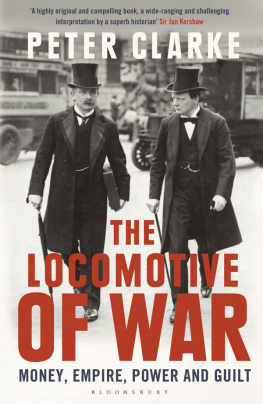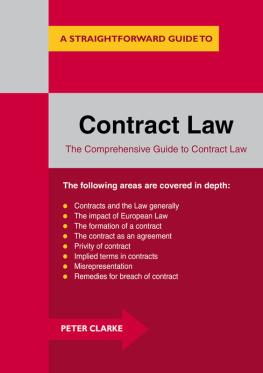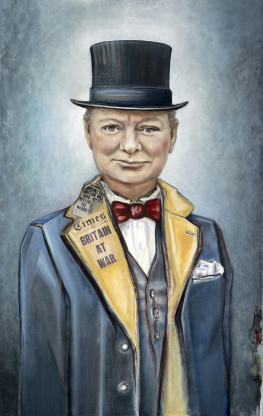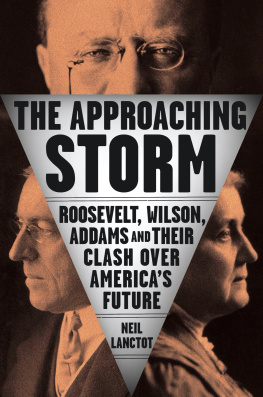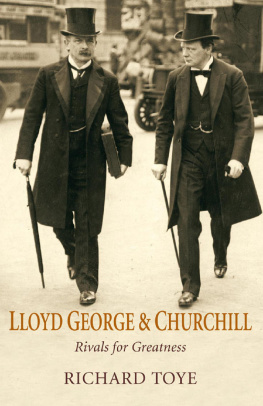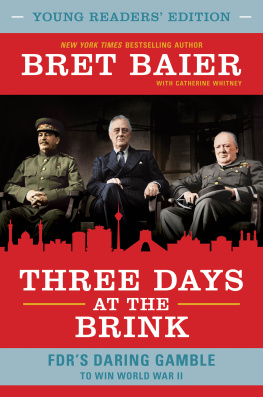THE LOCOMOTIVE OF WAR
BY THE SAME AUTHOR
Lancashire and the New Liberalism
Liberals and Social Democrats
The Keynesian Revolution in the Making, 192
Hope and Glory, Britain 190
The Keynesian Revolution and its Economic Consequences
A Question Of Leadership: Gladstone to Blair
The Cripps Version: The Life of Sir Stafford Cripps
The Last Thousand Days of the British Empire
Keynes: The Twentieth Centurys Most Influential Economist
Mr Churchills Profession

Bloomsbury Publishing
An imprint of Bloomsbury Publishing Plc
50 Bedford Square London WC1B 3DP UK
1385 Broadway New York NY 10018 USA
www.bloomsbury.com
BLOOMSBURY and the Diana logo are trademarks of Bloomsbury Publishing Plc
First published in Great Britain 2017
Peter Clarke, 2017
Peter Clarke has asserted his right under the Copyright, Designs and Patents Act, 1988, to be identified as the Author of this work.
Every reasonable effort has been made to trace copyright holders of material reproduced in this book, but if any have been inadvertently overlooked the publishers would be glad to hear from them.
All rights reserved. No part of this publication may be reproduced or transmitted in any form or by any means, electronic or mechanical, including photocopying, recording, or any information storage or retrieval system, without prior permission in writing from the publishers.
No responsibility for loss caused to any individual or organization acting on or refraining from action as a result of the material in this publication can be accepted by Bloomsbury or the author.
British Library Cataloguing-in-Publication Data
A catalogue record for this book is available from the British Library.
ISBN: HB: 978-1-4088-5165-4
EPUB: 978-1-4088-5164-7
To find out more about our authors and books visit www.bloomsbury.com. Here you will find extracts, author interviews, details of forthcoming events and the option to sign up for our newsletters.
For Emily and Libby
CONTENTS
To keep the narrative as clear and uncluttered as possible for the reader, I have restricted the numbered endnotes in the text. What these specify are only the references to some twenty-odd publications significant and widely cited sources on which my own history offers a critical commentary. This is specifically what I mean in the Prologue by special scrutiny of some texts generated by these events memoirs, diaries, letters and other published documents, along with some influential polemical tracts. In length, these vary from the sixty-nine fat volumes of Woodrow Wilsons papers to the spare thirty-nine pages of John Morleys memorandum on the 1914 crisis. But I am humbly conscious of how much this book also relies on the scholarship of other historians: sometimes in the form of my specific quotations but even more in the general insights that I have gleaned from their work. All these debts are, I hope, properly acknowledged in my Notes on Sources at the end, where I feel free to reflect more fully on the historiography as shaped by my many distinguished predecessors.
A Train of Thought
1 FROM TROTSKY TO PIKETTY
War is the locomotive of history. Is it? If so, how? And with what results? The phrase is often quoted, with or without attribution to Leon Trotsky. We tend to assume that Trotsky was speaking of Russia. After all, he was well aware of the crucial role of the First World War in giving the Bolsheviks their opportunity to seize power in Russia in 1917. He had been up to his neck in these events, as Lenins partner and rival; and, undeniably, the creation of the Soviet Union as a Communist state made history on the grand scale. But what if Trotskys claim about wars catastrophic impact and revolutionary potential did not really have Russia in mind? What if he had been thinking more of Great Britain and, in particular, the United States, when he talked about this locomotive?
We might call that a different train of thought. For Trotsky not only pointed to the motive force of war in making the history that had already happened but also appealed to it, prophetically, in guaranteeing the shape of the future, on the assumption that only one outcome was available, not only in Russia but elsewhere. But our perspective today is inevitably different. Trotsky, who has sometimes been hailed as a prophet, may now appear in a different light: not as a man whose expectations were fulfilled by the Russian revolution but as a man who somehow failed to understand the dynamics of history, especially the relationship between western capitalism and democracy, under conditions of war and peace alike.
I readily acknowledge some irony in appropriating Trotskys memorable image. For the conclusions that I draw are very different from Trotskys own claims. He was, of course, a follower of Karl Marx who was evidently another railway buff, since both men can be quoted deploying their own variations on the graphic image that either revolution or war is the locomotive in driving historical change. The source most commonly cited for Trotskys preferred formula is a speech that he gave at the end of 1922, and this context is illuminating about his own meaning.
It was only in 1917 that Trotsky had actually become a Bolshevik himself. Previously he had voiced prescient fears about the dictatorial tendencies implicit in Lenins methods. Yet it was Trotsky who opportunely supplied the idea that a socialist revolution might be instigated in backward Russia rather than just a bourgeois revolution to overthrow Tsarism. He thought this feasible if an alliance could be forged between the (relatively small) proletariat and the great masses of the peasantry who could thereby be liberated.
Lenin and Trotsky now agreed that the backwardness of Russia could be compensated by forcing the pace of history in this way, given that war had now made all of Europe ripe for revolution. With the Romanovs doomed, and the Habsburgs and the Hohenzollerns trembling, why should Windsor Castle or even the White House, those bastions of modern capitalism, not face a similar fate, sooner or later? Thus Trotsky came to speak of the skein of history unwinding from the wrong end . The point was that some temporary abridgment of democratic methods in Russia would be justified once the Bolshevik coup had the desired effect of stimulating proletarian revolution in the advanced capitalist countries in defeated Germany, of course, but also in Britain and the United States.
Alas for Trotsky, this ambitious scenario was already in need of revision by the time he addressed his comrades in the Communist International in 1922. By that point he had to acknowledge the rather patchy record of the immediate post-war years Bolshevik success at a price in the east, but a failure in western Europe that he attributed to poor political strategy. And the United States? Here he succumbed to a sobering sense of realism in acknowledging that a Communist revolution now had even bleaker prospects. It was an admission that the orator softened with a throwaway line, simply offering this parenthetical caveat: (naturally all sorts of new facts are possible such as, say, a war between America and Japan; and war, Comrades, is a great locomotive of history).
A loyal Trotskyite might claim that, twenty years before Pearl Harbor, the prophet at least correctly predicted that particular war. But the bigger point is that the famous phrase about the locomotive was defensively offered, for the obvious reason that Trotskys own predictions about the imminence of revolution in the advanced economies of the capitalist west were already under challenge from what he saw happening around him. His own assumption remained that, sooner or later, a Communist-led revolution would indeed overthrow and supersede capitalism by one route or another. Thus once the locomotive reaches the end of any journey, we might then proclaim this as its destination , as though it had always been destined to get there; but this sort of redefinition of destiny is actually little more than a play on words.

